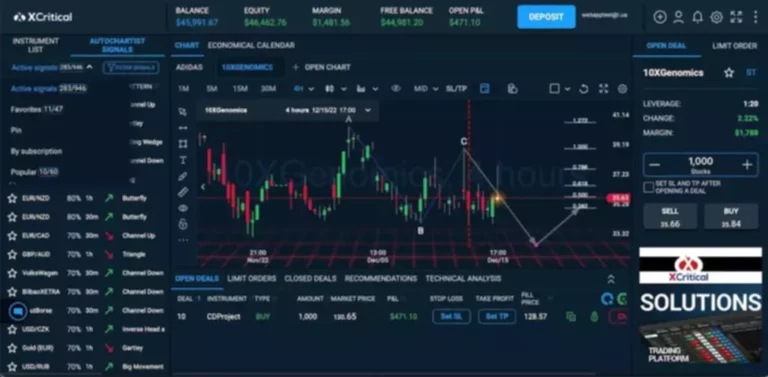Content
Some trading platforms, where individual investors buy and sell stocks, also use dark pools to Yield Farming execute trades using a payment for order flow. The lack of transparency within dark pools raises questions about market integrity, potential for insider trading, and the impact on price discovery. The fragmentation of liquidity and the potential for a two-tiered market can also impact retail investors’ access to liquidity and trading opportunities. Operated by broker-dealers or independent trading platforms, dark pools function differently from traditional exchanges.
- Because of this, institutional investors frequently use the dark pool, either because they don’t want the market to know what they’re buying before they do or because they want to use high-frequency trading (HFT).
- A surprisingly large proportion of broker-dealer dark pool trades are executed within the pools–a process that is known as internalization, even when the broker-dealer has a small share of the U.S. market.
- Instead, they’re meant for institutional investors who regularly place large orders for their clients.
- In the second case, they can trade large data blocks in milliseconds ahead of the other investors and get large profits.
- Critics argue that dark pools contribute to market fragmentation and reduce transparency, making it harder for regulators to monitor trades and ensure that markets are fair.
- This delay is a strategic measure to prevent large trades from influencing public market prices in real time.
What Role Does Matching Engine Software Play in Your Exchange’s Functionality?
Finding a financial advisor could help when considering dark pool trading and evaluating the various investment types such as stocks, bonds, or mutual funds. Exchange-owned dark pools include those offered by NYSE Euronext, BATS Trading, and London Stock Exchange’s Turquoise. These dark pools dark pool software are mostly targeted by high frequency traders and form an important part of their automated trading strategies. The lack of restrictions in shadow banking means that institutions can provide credit to those that would not usually receive access. There is also no investment insurance provided under a shadow banking system.

What Is an Institutional Investor & How Does It Differ from a Retail Investor?
Agency brokers operate as independent third parties solely on executing client trades. Without proprietary trading activities, these dark pools avoid conflicts of interest, making them a preferred option for clients who want assurance that the platform has https://www.xcritical.com/ no vested interest in trade outcomes. But there have been instances of illegal practices such as front-running, insider trading and price distortion in dark pools. This led to the development of dark pools, which are essentially private versions of these electronic communication networks.

Dark Pool Trading Guide for Investors
During this process, securities are transferred to the buyer’s account, and funds are transferred to the seller’s account, completing the trade. After a trade is reported, it appears as part of the consolidated dark pool trading data in market feeds. This aggregate data provides a broad view of trading activity without revealing specific details, preserving the anonymity of the original traders while ensuring that some level of market transparency is maintained. This lack of visibility protects the identities and intentions of the investors.
As discussed, dark pools are sometimes referred to as “dark pools of liquidity,” and are a type of alternative trading system used by large institutional investors to which the investing public does not have access. As dark pools have grown in prominence, they’ve attracted criticism from many directions, and scrutiny from regulators. For instance, the lack of transparency in dark pools and the exclusivity of their clientele makes some investors uneasy.
High frequency trading allows traders to execute their large orders ahead of other investors meaning they can capitalize on changes in share prices. Described as legal piracy by some, high frequency traders can earn huge and instantaneous profits when subsequent orders are made. The shadow banking system refers to various financial institutions such as hedge funds and investment banks which take on risks that traditional banks would not or could not take on as a result of tighter restrictions. Dark pools can charge lower fees than exchanges as they are housed within a large firm, not a bank. Dark pool trading is done privately between the buyer and seller, often with the help of brokers.
Insights to attract and retain investors who are eager for additional market intelligence. By featuring unique data, they position themselves as a more desirable option for certain traders or investors. Dark PoolDark pools are private trading venues or exchanges where institutional investors, such as mutual funds, hedge funds, and pension funds, can trade large blocks of securities away fr… Prints can sometimes be exclusive to specific trading platforms, such as Charles Schwab, due to a few key reasons.

Trading provides a way for large investors to trade significant volumes without moving the market against themselves, but it also introduces complexities regarding market transparency and fairness. The balance between these factors continues to be a point of regulatory focus. They may have the necessary systems and processes in place to handle sensitive and complex data that others can’t. Prints often reveal intriguing insights for market analysts, especially when there’s a noticeable discrepancy in reported volumes.
Dark pools can charge lower fees than exchanges because they are often housed within a large firm and not necessarily a bank. Since the details of the trades are not available to the public, it can be challenging to assess the impact of dark pool trading on the broader market. This is one of the reasons that led to the invention of dark pools (also known as dark liquidity), which are private networks for executing trades.
Investors earn money by placing limit orders in the dark pool, which allows them to buy or sell securities at a specified price or better. One advantage of Electronic Market Marker dark pools is that they offer greater liquidity due to high-frequency trading algorithms, which allow for faster and more efficient trade executions. [One disadvantage of EMM dark pools is that they are more vulnerable to high-frequency trading strategies and aggressive traders, which can lead to market manipulation and unfair advantages for certain traders. A dark pool is a private financial forum or exchange mostly used by institutional investors for trading financial instruments like securities and derivatives.
One of the primary benefits of dark pools is that they reduce market impact, meaning that the execution of a large trade does not significantly affect the price of the security being traded. Most of the time, dark pool stocks are owned by mainstream financial companies such as Morgan Stanley or the New York Stock Exchange (NYSE). But the difference is that the identity of the users is hidden during the transactions. Despite their benefits, dark pools have faced scrutiny and criticism, as they can reduce transparency in financial markets and potentially lead to information asymmetry.
ATS, especially dark pools, allow large institutional investors to trade without revealing their trading intentions to the public, which can help to reduce market impact. ATS also provides traders with the flexibility to execute trades without having to follow strict rules and regulations that are imposed in traditional stock exchanges. Visibility of Dark PoolDark pools are private trading venues or exchanges where institutional investors, such as mutual funds, hedge funds, and pension funds, can trade large blocks of securities away fr… Prints on specific platforms is often a result of strategic partnerships, advanced technology, market positioning, and investment decisions.
In these dark pools, algorithms provide liquidity that instantly matches buy and sell orders within the pool. This algorithmic trading style enables continuous liquidity, which is crucial for large-volume trades. Dark pools have gained significant traction in recent years, now constituting a substantial portion of trading volume in global markets. This surge in popularity can be attributed to the allure of reduced market impact and the confidentiality they offer to large investors who prefer to keep their strategies under wraps.
The involvement of clearing houses ensures that both sides of the trade are executed smoothly and reliably, maintaining the integrity of the trading process. Broker-dealer-owned Dark Pools provide access to a wider range of financial products, unbiased advice, and no conflicts of interest. But they have higher fees and commissions, limited proprietary products, less research and analysis, and less personalized service.
Volume discrepancies in dark poolDark pools are private trading venues or exchanges where institutional investors, such as mutual funds, hedge funds, and pension funds, can trade large blocks of securities away fr… While they can provide clues to substantial institutional movements, they also introduce a layer of complexity and uncertainty into market analysis. As a result, traders need to remain vigilant and consider these factors in their decision-making process. Dark poolDark pools are private trading venues or exchanges where institutional investors, such as mutual funds, hedge funds, and pension funds, can trade large blocks of securities away fr…






